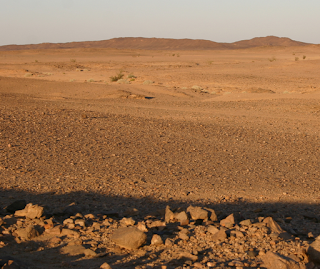Marhum Qadhi was a scholar of the highest calibre in Najaf
in the last century. He taught akhlaq, aqaaid and 'irfan, and
was also well versed in falsafah and fiqh. Many great scholars
of the previous generation were his students. He had a special status and
piety, which enabled him to perform many miraculous acts, some of which his
students have described.
One of the teachers at the Hawza in Najaf reports:
“I had heard much about the wondrous abilities of Marhum
Qadhi, but I doubted whether the stories were actually true or not, until one
day, when I met him outside the masjid of Kufa. I greeted him and we spoke
together for a few moments. When we reached the entrance of the mosque of Kufa,
(which was facing the open desert), we sat outside facing the qiblah
in the shade of one of the walls of the mosque, for some rest, before we
entering the mosque.
We began a discussion and Marhum Qadhi related some
matters about the secrets and signs of Allah swt, the definition of tawhid,
the importance of pondering deeply on this subject and the fact that this is
the true and the only purpose of man's creation. The talk continued until the
call for prayers came.
As he spoke, I thought to myself, “Truly, we are all
confused and totally unaware of the actual reality of our creation. How
shameful will it be if our lives end in this manner? What he says is so true,
and if we do not take benefit from it, then woe to us!”
Suddenly, I saw a large snake come out of its lair and begin
to slide next to the wall of the mosque, coming towards us. There were many
snakes in that region, and people would often see them, but they did not
usually attack anyone. However, this snake came right next to us, really
frightening me. I noticed that immediately Marhum Qadhi pointed at it (the
snake) and said, “mut, bi idhnillah” - i.e. “die, by the
permission of Allah!” To my utter surprise, I saw that the snake
immediately withered away and died. Then without even pausing for a moment,
he concluded his comments and then we stood up to attend the prayers.
Marhum Qadhi recited his prayers in the mosque and then
retired to a side room where he used to engage in worship. I also performed
some a'mal, and then decided to return to Najaf. Before I
left, a thought passed in my mind, “was the snake truly dead or had this man
somehow tricked me, as some magicians do?” I decided to go and examine the
snake to see if it was actually dead. I went out and saw that it was exactly in
the same place, dead & dried up. I pushed it to check - it did not move. I
became ashamed of my doubts and returned to the mosque to continue with
prayers, but I could not concentrate.
Marhum Qadhi remained in his room for some time engrossed
in his worship, and then came out and left the mosque. I also came out and we
met again. As soon as he saw me, he turned to me and with a smile said, “Well
sir, you tested me, you tested me!”























